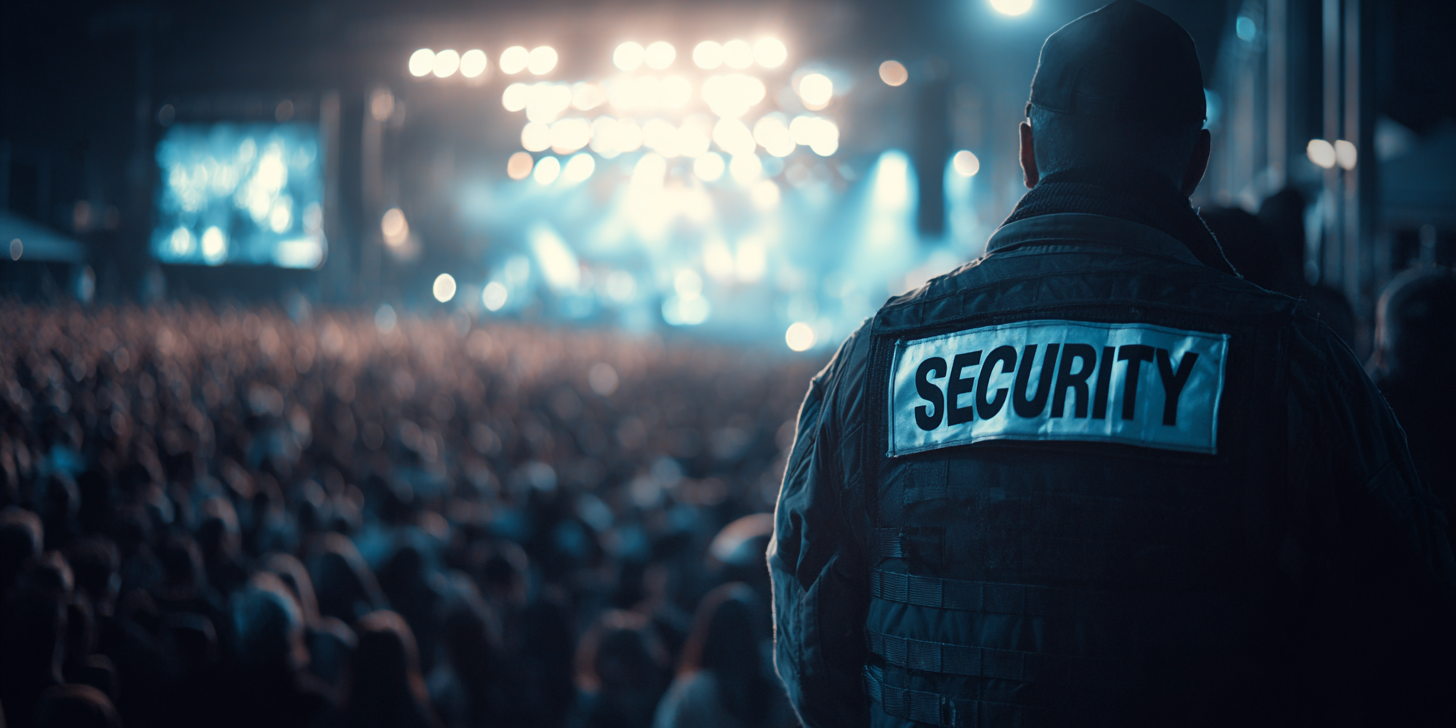Safety has always been a key issue in the events industry. From trade fairs and congresses to festivals and corporate events, organisers must identify potential risks, implement preventative measures, and respond flexibly to unforeseen situations. The latest developments demonstrate that security encompasses far more than just admission controls and escape routes. It encompasses digital systems, infrastructure issues, the protection of sensitive data, and the well-being of guests. Examining the latest trends illustrates just how diverse the requirements will be in 2025.
Crowd management: ensuring safety in crowds.
Crowds are an inevitable part of many events. The industry has learnt that risks can arise if visitor flows are not managed effectively and information is not communicated promptly.
Nowadays, many festivals and major events rely on digital crowd management systems. Visitors can use apps to access real-time information about the capacity of certain areas, alternative routes and programme changes. Push notifications complement traditional loudspeaker announcements, reaching people directly on their smartphones. There is also increased route planning, with clear entrances and exits, one-way systems and staggered entry time slots. The aim is not to work against the crowd, but to manage it intelligently.
Increased physical security measures.
The political situation, coupled with individual cases such as assassinations or attacks on executives, has heightened awareness of physical risks. Security zones featuring metal detectors, explosive detection dogs and a police presence are becoming increasingly common at leading international trade fairs. High-ranking guests are provided with professional security escorts, and extended bag checks and secure entrance areas have become standard for the general public.
For event organisers, this means coordinating security concepts more closely with the relevant authorities, the police, and private security services. The focus is on protecting the public and ensuring that trade fairs and concerts run smoothly, even if this incurs higher costs and requires more organisational effort.
Digital security: data in focus
Digitalisation is fundamentally changing the security architecture of events. Data has become a critical factor. It is essential to protect participant data, ticketing systems, payment information and streaming access against attacks.
Blockchain-based ticketing is a growing trend that makes tickets forgery-proof and curbs the black market. Meanwhile, zero-trust architectures and network micro-segmentation are becoming increasingly important as hybrid and virtual event formats become more reliant on digital infrastructure.
Event organisers must strictly adhere to data protection guidelines, such as the GDPR, and ensure that their systems are regularly checked. Cybersecurity is now an integral part of event management, not just an issue for the IT department.
Use secure infrastructure as the foundation for your events.
On a physical level, event organisers invest in robust floor coverings, modular grandstand systems and modern barrier technology. The aim is to ensure the safety of visitors as well as to facilitate logistical processes – from set-up and dismantling to evacuation. In addition, there are mobile admission and access systems that can be flexibly customised depending on the size of the event, as well as barrier-free solutions that enable safe access for all guests. Emergency power generators, fire protection concepts and clearly signposted escape routes are also integral parts of modern infrastructure. These measures not only help to minimise risk, but also create trust among all those involved.
Climate risks and weather extremes
The effects of climate change are also being felt within the events industry. Storms, heatwaves and heavy rain present new challenges, particularly for outdoor events. In regions experiencing heightened heat stress, such as southern Europe and Australia, festivals are increasingly being cancelled or adapted at short notice due to sudden extreme weather events, such as heatwaves, heavy rain and storms.
Modern safety concepts therefore rely on climate-proof infrastructure, including weather-resistant stages, optimised drainage systems, shading and even dance floor irrigation systems to provide cooling in hot weather. Effective communication is also essential: in the event of sudden weather changes, guests must be promptly and clearly informed about potential risks and necessary measures, such as via apps, social media, visible notices, or on-site announcements.
Health and well-being are at the forefront.
Another trend is the incorporation of wellness and mental health elements into safety concepts. After all, security means more than just protection from external dangers; it also encompasses the well-being of participants. An increasing number of conferences and festivals are offering retreats, relaxation zones and short mindfulness programmes. These measures lower stress levels, reduce the potential for conflict and ensure a positive overall event experience.
This approach offers event organisers a fresh perspective: safety can be viewed as a holistic concept that considers both psychological and physical factors equally.
Cooperation and prevention are key.
One thing is clear from all the trends: security is not an isolated task for individual departments. Successful event organisers rely on interdisciplinary cooperation. Technical service providers, security teams, the authorities, IT specialists and event managers all work together. Prevention and constant monitoring of measures are crucial to avoiding risks in the first place.
Workshops, simulations and regular tests are now standard features, just like the integration of new technologies. This is the only way to ensure that safety plans work in an emergency as well as existing on paper.
Security is an integral part of event design.
Security requirements in the events industry are more diverse than ever before in 2025. These range from digital data protection and physical security measures to crowd management and well-being. All these developments have one thing in common: security is no longer just a background task, but is becoming an integral part of event design.
For event organisers, this means giving equal consideration to technical and human factors. Those who view security as added value and adopt innovative approaches ensure that everything runs smoothly and strengthen the trust of participants, partners and sponsors. Prolight + Sound is the platform where these trends can be observed, discussed and implemented.






